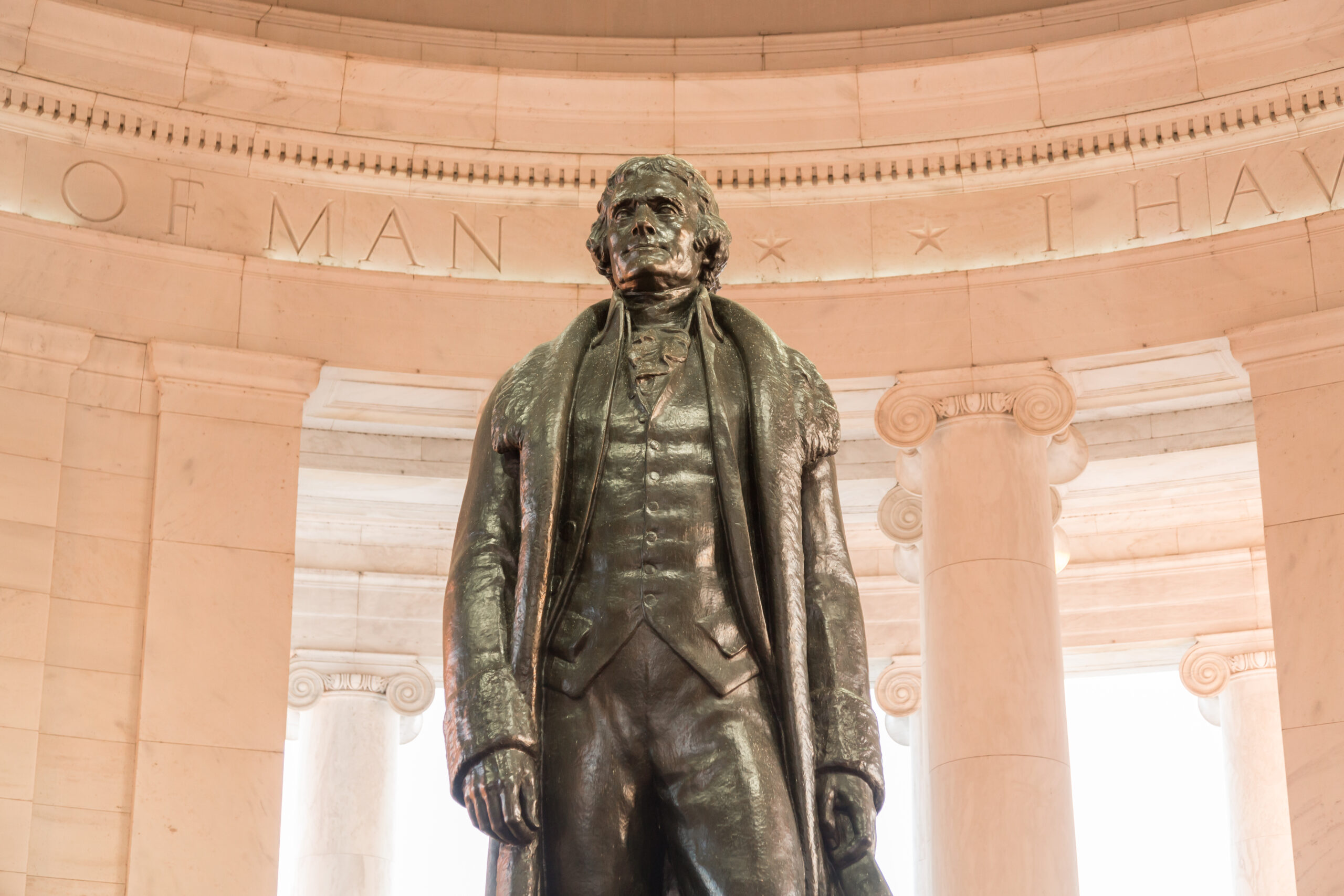
A document I saw on the web last week illustrates a thousand others like it. It pretends to celebrate the life and thought of Thomas Jefferson, and ends the litanies with several quotes from him. Except for one of these I knew and some that could be genuine, the rest were suspicious. I tested two, chosen more or less at random. One was a paraphrase, the other one was fake.
The underlying problem of this sort of enterprise seems to lie in an invalid syllogism: Statement P is true; Jefferson only made true statements; therefore, Jefferson could have made statement P. Granting the premises, the conclusion is valid but useless. The corollary “he said it” is clearly invalid.
This approach can be seen as a simple case of circular reasoning. Consider the claim “Statement P is true, therefore Jefferson could (or must) have said it.” But how does the speaker know that statement P is true? I suspect he would say that it is “because Jefferson said it.” In short, the quote comes from Jefferson because it is true, and it is true because it comes from Jefferson.
It seems that many people’s whole political-philosophical outlook is based on faulty logic, circular reasoning, and false information. Believing them on their word has, for some others, the benefit of confirming their prior biases. By giving each person his own printing press, social media has deepened the problem.

It is often historically obvious that a quote cannot be genuine—when, for example, Cicero is quoted about the government deficit, which could not exist at the time of the Roman Republic. In other cases, following a simple principle prevents the danger: if a quote has no credible source, assume it is spurious, intentionally or not. (Some sources are more credible than others, whether or not they echo what you believe.) A person who wants you to believe a statement and who has some respect for you will make sure that the statement meets some minimum standards of truth.
With AI’s capacity to manufacture “deep fakes”—instead of the ordinary fakes I have been speaking of—much worse is coming. Can we hope that people will have the ability to be critical of the information they receive without being cynical (“Everything is false, except what I know in my guts”)? This is not merely a psychological danger. From those who think that they have a right to prevent other individuals from living peacefully as they want to, it is a mortal political risk.

READER COMMENTS
Craig
Feb 14 2024 at 11:11am
Hope isn’t a plan. I actually have confidence here that digital seals, the modern version of medieval wax seals, will emerge, quite probably using some kind of blockchain, to allow users to verify content. Think twitter blue check on steroids.
https://www.youtube.com/watch?v=iyiOVUbsPcM
Tom Cruise deep fakes. Can you tell the difference between the real Tom Cruise and the deep fake? Given that its a deep fake many will say they can tell, but if you ask me its very good, so now anything Tom Cruise becomes suspect, right? Either you trust your ability to discern the difference, or you don’t and maybe his mom would be able to tell, but I can’t. Since I can’t trust the persona, I will need something else.
Everything becomes suspect at minimum because once the technology makes it impossible to discern the difference, you must consider the possibility it is a deep fake because it could be a deep fake. Fool me once, shame on you….so ultimately the solution is to have something the AI cannot fake to accompany the content.
David Seltzer
Feb 14 2024 at 2:01pm
Pierre: I suspect being agnostic can preclude cynicism. I’m comfortable with the idea that one can’t always prove the source of a quote, but fails to disprove it.
Pierre Lemieux
Feb 14 2024 at 4:10pm
David: I think proofs of existence are different than experimental proofs of theoretical implications (the bread and butter of science). In the case of existence, what is difficult to prove is non-existence. Proving that unicorns do exist is simple: you just have to produce one specimen. Similarly, proving that the source of a (say) Jefferson quote exists is simple: you only have to find it in one of his letters or speeches. Proving that it does not exist is more difficult and always tentative–although not if we have all his writings. (But I am quite willing to be proven wrong.)
David Seltzer
Feb 15 2024 at 7:35am
Pierre: I agree. Thanks.
steve
Feb 14 2024 at 10:56pm
Went to a week long conference last year on free speech. While the focus of every speaker was on supporting free speech there was discussion on how deepfakes and other disinformation takes advantage of free speech. I think that in spite of this we should continue to support free speech but the problems caused by deepfakes, etc are going to lead towards a push for restrictions. It’s going to take strong arguments to avoid those.
Steve
Pierre Lemieux
Feb 15 2024 at 12:02am
Steve: I agree. I think we have to heed Hayek’s warning: we can always imagine what will be the “good” effects of a restriction of individual liberty, but we cannot imagine the unknown benefits that will be lost.
Robert EV
Feb 19 2024 at 1:52pm
Materially deepfakes seem a kind with old-school yellow journalism. They’re a bit worse in that the people won’t just be reading about it, but also viewing/hearing them, which strengthens impression. Skepticism polarizes and is often based on “that’s not what I heard” and so baseless, but I think it’s probably stronger these days.
Ron Browning
Feb 15 2024 at 8:25am
If a person can hold out hope that his fellow citizens will become more responsible for the results of their choices, then that person can hope that these same fellow citizens will become more able to critically view information they receive. Otherwise, hope, seems to me, misplaced. This does not preclude overall material advancement.
Robert EV
Feb 19 2024 at 1:48pm
The core issue for this particular issue of false quotes is the weight that people put on the person attributed to them. For historians the veracity of quotes is important to help build an accurate model of the beliefs of given persons at given times. For everyone else, yes, Jefferson was an expert on the governance of the British empire at the time, but enough years have past that anything he said has to be taken with the same grain of salt as he had to take anything Galen wrote about human health.
My own pet peeve is that founder whose name I forget who made that statement about the perils of democracy, despite direct democracy having been practiced in parts of Switzerland (an acknowledged inspiration for so many of the founders) for over 250 years at that point. And yet people still bring up his quote as if the evils of direct democracy are a bugabooish devil-you-don’t-know when they straight up knew about it when the quote was first said.
Unless you’re a historian, or it’s a recent expert saying something, the provenance of quotes is not important compared to the accuracy of the quote to modern times. And other experts today are indeed capable of evaluating this.
Warren Platts
Feb 19 2024 at 6:49pm
This is nothing new. Fake news, aka propaganda, has been going on for centuries. You have to look for the tells. And when anybody has an axe to grind, they’re going to bend things to their perceived benefit.
nobody.really
Feb 21 2024 at 12:54am
“Roughly 86% of statistics you read on the internet are completely made up.” –Thomas Jefferson
Comments are closed.